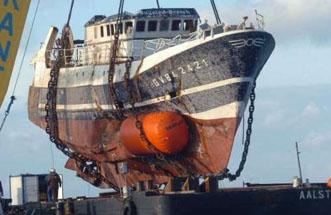
With a major military sea exercise commencing today off Western Scotland we highlighted (in Celtic News see http://groups.yahoo.com/group/celtic_league/message/2580 concerns about ecological and environmental issues. However, NATO exercises, particularly involving submarines, have also claimed a toll of human lives over the past forty years. The Celtic League has documented over twenty suspicious sinkings
With a major military sea exercise commencing today off Western Scotland we highlighted (in Celtic News see : http://groups.yahoo.com/group/celtic_league/message/2580 ) concerns about ecological and environmental issues.
However, NATO exercises, particularly involving submarines, have also claimed a toll of human lives over the past forty years. The Celtic League has documented over twenty suspicious sinkings of motor fishing vessels. In the period since 1970 over 150 fishermen have died in questionable circumstances in submarine exercise areas around the British Isles.
The most recent casualty was the \'Bugaled Breizh\' in 2004 in which the 5 Breton crewmen died.
Recently, judges in charge of the case have stated that the hypothesis that the fishing vessel was sunk by a submarine was very likely.
At a meeting in The Hague, to make the transmission of information between French and British authorities easier, the examining judges Richard Foltzer and Murielle Corre said that :
\"The other hypotheses which seemed very likely the day after the shipwreck, are almost all rejected now.\"
The Bugaled Breizh fishing trawler was sunk off the coast of the Lizard Peninsula in Cornwall on 15th January 2004 with the loss of all 5 crew members. The circumstances surrounding the loss, including good weather \"the absence of shock\", \"the high stability of the trawler\" and in particular the presence of Royal Navy and NATO submarines in the area at the time, made the hypothesis that the vessel had been sunk by a submarine more than possible. The British, French and Dutch Navies however all denied that their submarines were in the area at the time, but several discrepancies emerged in the evidence presented by the British Navy last year to the French court.
The wreck of the Bugaled Breizh was found with 140 extra cables around it on the port side. According to some experts and the families of the victims, this could be explained by a collision with a submarine which sank the trawler. Judge Foltzer told The Hague hearing in February that :
\"The exogenous force which was dealt [to the Bugaled Breizh] can not be anything else but a submarine\". Foltzer stopped short from giving the name of the submarine that could have possibly caused the wreck.
As a consequence of the many sinkings of fishing vessels by submarines in 1980 the Celtic League began its campaign to regulate and restrict submarine activity in fishing areas. We lobbied National governments and International bodies such as the International Maritime Organisation (IMO). Progress was slow but by the mid 1980s the IMO had adopted the first \'Resolution\' (A599) to address the issue. This was subsequently complemented by further IMO action.
National governments also responded and in the 1990s a system of notification to fishermen about the presence of any danger from military activity in exercise areas was introduced.
Fishermen in areas off Scotland where todays exercise gets underway are now able to tune in to a special frequency Royal Navy radio frequency on which \'subfacts\' are broadcast to alert them to any potential hazard.
Sadly however all systems are not foolproof and in the case of the Bugaled Breizh the \'subfacts\' system, which covers Southern waters including exercise areas in the Channel and off Cornwall, seems to have failed.
In the early 1990s, with the end of the Cold War, the Celtic League laid a wreath at sea in a submarine exercise area to the south west of the Isle of Man. We listed the vessels lost in suspicious circumstance.
It was hoped that less military activity would also mean an end to such losses. However, the loss of the \'Bugaled Breizh\' has meant that hope has not been realised.
The Breton and Cornish Branches of the Celtic League are currently working together to erect a memorial stone on the Lizard Peninsula in Cornwall in memory of those fishermen who lost their lives.
Related articles on Celtic News at:
http://groups.yahoo.com/group/celtic_league/message/2432 http://groups.yahoo.com/group/celtic_league/message/2273 http://groups.yahoo.com/group/celtic_league/message/2257 http://groups.yahoo.com/group/celtic_league/message/2187 http://groups.yahoo.com/group/celtic_league/message/2142 http://groups.yahoo.com/group/celtic_league/message/2085 http://groups.yahoo.com/group/celtic_league/message/2070 http://groups.yahoo.com/group/celtic_league/message/2057 http://groups.yahoo.com/group/celtic_league/message/1986 http://groups.yahoo.com/group/celtic_league/message/1978 http://groups.yahoo.com/group/celtic_league/message/1514 http://groups.yahoo.com/group/celtic_league/message/1497 http://groups.yahoo.com/group/celtic_league/message/1471 http://groups.yahoo.com/group/celtic_league/message/1464 http://groups.yahoo.com/group/celtic_league/message/1411 http://groups.yahoo.com/group/celtic_league/message/1398 http://groups.yahoo.com/group/celtic_league/message/1388 http://groups.yahoo.com/group/celtic_league/message/1381 http://groups.yahoo.com/group/celtic_league/message/1366 http://groups.yahoo.com/group/celtic_league/message/1361Older Celtic News archive about military exercise safety campaign by Celtic League here:
http://celticleague.net/archive/subs.htmlDetails on current \'subfacts\' system relation to exercise \'Joint Warrior 081\' here:
http://www.rnopsscotland.com/J B Moffatt Director of Information Celtic League
19/04/08

Commentaires (0)
Aucun commentaire pour le moment. Soyez le premier à réagir !